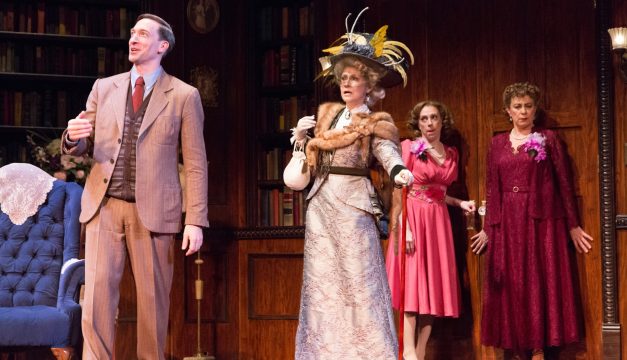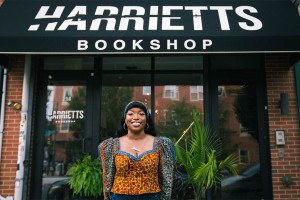REVIEW: Harvey at the Walnut Street Theatre

Ben Dibble, Susan Riley Stevens, Ellie Mooney, and Mary Martello in Harvey. (Photo by Mark Garvin)
As a critic, I know I shouldn’t equate one actor with another. It’s simplistic and reductive — artists should be judged on their own merits, and every good actor brings something personal to a role.
And yet — Ben Dibble is Philadelphia’s James Stewart. I say that not because they’re similar types (they aren’t, really), and not because Dibble imitates Stewart (he certainly doesn’t). But Dibble, in his own way, possesses similar theatrical qualities to those that made America fall in love with Stewart in the 1930s, including optimistic boyishness, a certain folksy small-town charm, and most winningly, a sense that he’s modestly unaware of his considerable appeal.
I make the comparison here because Stewart is forever linked with the role of Elwood P. Dowd, the sweetly unflappable protagonist of Harvey, whose friendship with an invisible, six foot tall rabbit is the play’s starting point. Dibble, starring in Harvey at the Walnut Street Theatre, makes the part of Elwood his own, imbuing it with all the luminous sweetness I could have hoped for.
Whether Mary Chase’s play, winner of a Pulitzer Prize (over The Glass Menagerie — let that sink in for minute!) is a worthy vehicle is an open question. Despite its slender conceit, there is something of substance in Harvey, which argues persuasively that heart, imagination, and compassion are the fundamental building blocks of personal character, and also has a healthy disregard for so-called respectability and institutional authority (including particular disdain for psychiatry and the judiciary). But there’s also no mistaking that Chase’s script is fundamentally dated.
Nonetheless, Walnut Street has thrown considerable resources at Harvey. Sets and costumes are lavish, and the supporting cast boasts some of Philadelphia’s finest — including Mary Martello, Ian Merrill Peakes, Greg Wood, and more. Under Bob Carlton’s direction, they show themselves to be able farceurs, all.
There’s the rub. Harvey is not a farce. Despite some broad elements, it’s an altogether gentler kind of comedy (at times, a rather serious one), drawing most of its humor from character traits rather than jokes. Here, the appliqué of funny line readings, physical shtick, and a general sense of frantic energy run contrary to the style, sometimes robbing the play of its charm, rather than illuminating it. The persuasive moments —and there are some, especially from Dibble — are the lovely, quiet ones.
Harvey runs through March 6. For more information, visit the Walnut Street Theatre’s website.


